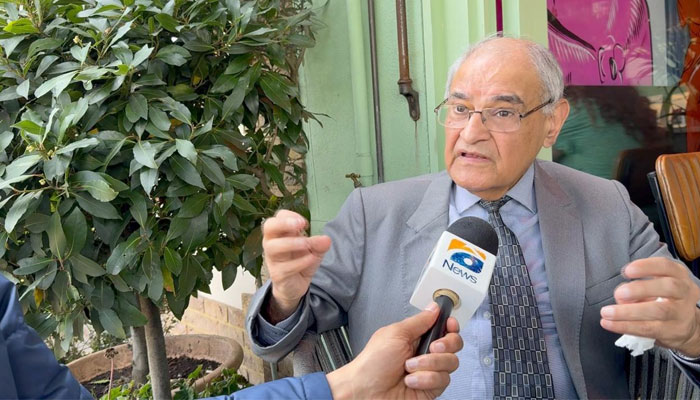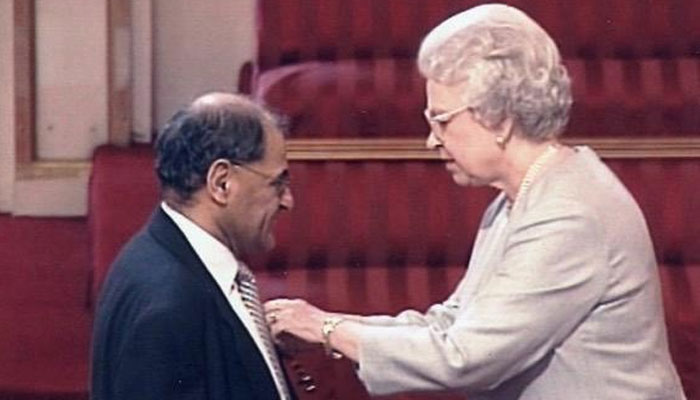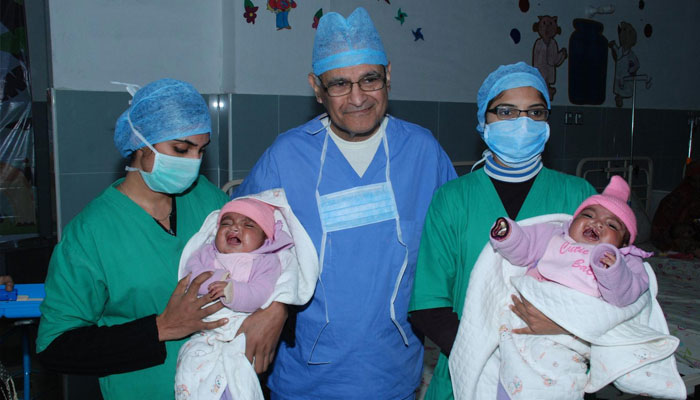[ad_1]
UK’s senior most Muslim doctor asks Pakistan government to focus on vocational training for poor

LONDON: One of Britain’s senior most and respected Consultant Paediatrician Professor Abdul Rashid Gatrad OBE has called on the Pakistan government to empower, with vocational training, the most under-privileged children, aligning this to the United Nations Sustainable Development Goals.
As CEO of a charitable organisation working in Pakistan and Azad Kashmir Prof Gatrad has raised over £3 million for various health-related development projects around the world. He has built, with his colleagues, a state-of-the-art Cleft Hospital in Pakistan, Gujarat.
The project was completed so professionally and was so impactful that ITV presented a 15-minute documentary on it. All services including operations are provided free, funded by mainly Muslim and Pakistani donors in the West Midlands.
Gatrad, the Professor of Paediatrics and Child Health at three universities — University of Birmingham, Universities of Kentucky and Wolverhampton — was awarded with the OBE from the Queen in 2002 for services to ethnic minority children in the Midlands and in 2014 was made deputy Lieutenant to Her Majesty the Queen for his services.

In the same year, he was made Freeman of the Borough of Walsall for halving the death rate in new-born babies and for his part in the research into the Hepatitis Vaccine that was subsequently rolled out globally.
Born originally in Malawi, Africa, Dr Rashid Gatrad worked as a postman in the UK to meet his medical college fees before starting as a doctor in 1971.
In 2003 Prof Gatrad met Khawaja Mohammed Aslam, a Pakistani bus driver and a businessman, who was the chairman of the charitable organisation.
He invited him in 2005 to be the CEO. Since then, the charity has made a huge difference to the lives of hundreds of thousands around the world — particularly children.
At the time the charity only had £20,000 of working capital and Pakistan was the only country where humanitarian aid was provided. Since then, Rashid has sacrificed time, effort, energy and money to make MIAT truly global — now in over 20 countries.
Professor Gatrad largely financed state of the art 3 storey hospital — which houses audiology, speech therapy, dental services 2 wards and 2 operating theatres — through the charity.
The hospital is supported by four doctors running round the clock operations and providing free medical aid to patients of the area, including those who travel from far and wide.
The hospital grounds have playing facilities. Then it was in 2016 when during a visit to Gujarat that he met a female teenage street beggar on crutches. She had clubbed feet that were bare and bleeding.
This led to Professor Rashid Gatrad setting up the clubfoot centre where now hundreds are being treated from birth — avoiding operations when older.
“I request the Government of Pakistan to pay attention to vocationally train children and youth to empower them, especially girls. This will be good for Pakistan’s long-term development.
Currently, there is no focus on this area. We are prepared to work with Pakistan to support the effort. We have completed a huge maternity and a children’s hospital named after my mother Jubaida in Gujarat, Pakistan which now is dedicated to cleft operations. This hospital is a demonstration of what can be achieved.” he said.

Prof Gatrad further stated that their charity goal was to reduce poverty and improve health outcomes from sustainable projects for thousands of the most disadvantaged populations in over 20 countries across Africa and Asia.
“The Jubaida Gatrad hospital was completed in 2015 and now provides employment to many. Our charity provided medical equipment, and the hospital is attracting more and more people to Gujarat city,” he added.
The professor told this correspondent that after he set up the club foot centre at this hospital in 2016, Ruth Lawson from the British High Commission attended its inaugural opening to witness the highly trained international cleft/clubfoot surgical team from the UK that Gatrad had assembled.
The Overseas Plastic Surgery Appeal (OPSA) team of 20 strong travels twice a year to Pakistan, he said.
“All give up their time free for projects in which I have led the development of a very clear and targeted model of interventions — namely an integrated and multi-sectoral pathway of care of children that resources local healthcare capacities to screen them, and in the process provide children access to education through, for example, help with hearing and speech therapy. Now an intensive care centre is under construction, funded by us.”
Deafkidz International Director Steve Crump visited the centre in 2017 and hailed it as a revolutionary set up for a facility like that in Pakistan. Over subsequent 3 years he helped develop the audiology services.
The professor said: “Collaborating with Deafkidz International, we have screened 20,000 children with deafness, in Punjab, Pakistan. Now 20 million people in the Sindh district have access to this service that I helped set up and facilitated. Improving such disabilities and supporting education, particularly for girls, ensures that children take their rightful place in society and do not beg on the streets with a potential for abuse and trafficking.”
He said: “Over the last 15 years, in addition to the cleft and club foot centres we have set up in Pakistan, a breast care service for women, an artificial limb fitting centre, which houses the club foot centre named after my father Mahomed Gatrad, cataract camps, hearing services for the newborn, dental services and an outreach clinic for elderly and pregnant women in Sooklan Gujarat.”
The veteran doctor’s work extends to over 20 countries, including Somalia, Malawi, Gambia, Syria, Bangladesh, Haiti, the Dem Rep of Congo, and Nepal where he provided 1000 huts for families with children, the elderly and the disabled, after the earthquake in 2014.
“A lot of my international work is funded from my NHS salary donated through the GAYE scheme over the last 15 years. In addition, I get strong financial support from connections with the businesspeople world-wide in countries such as Dubai, UK, South Africa etc.”
The doctor explained he has arranged over 5000 cataract operations in Pakistan, Kashmir and Malawi; delivered over 500 cataract operations in Bangladesh; carried out 40 operations in Sierra Leone on teenage girls with vaginal fistulae; delivered food provisions, fresh water and blankets to refugees in Syria, Jordon, Kenya and Lebanon.
Moreover, he built a 3km fresh water pipeline in a village in Somalia; built houses in Malawi in Nepal, Bangladesh and Pakistan after the floods and supported vocational training projects in Sierra Leone, Malawi, Turkey, India, Kashmir and Pakistan.
“Over the last 10 years I have been providing two ‘Gatrad Bursaries’ per year to doctors and nurses who travel abroad to train and teach,” he adde.
Prof Gatrad regularly travels to Gujarat to train and teach nurses in the care of new-born babies. He has trained more than 1200 nurses over the last 15 years and some of the nurses he trained now work in England and Europe in the medical profession.
Over 6 years ago he set up WASUP — World Against Single Use Plastic which incorporates impacts of climate change. He has fought tooth and nail to decrease plastic pollution through Refuse, Reduce Reuse and Recycle principles. He has given talks to many august organisations including UNESCO on these subjects.
Even at the age of 78, he is still full of enthusiasm to make a difference to the lives of the needy. Professor Gatrad plans to visit Pakistan again with a hope of meeting government officials to raise the profile for his charity’s campaign for vocational education for some of the most downtrodden sections of the society.
The renowned doctor remains determined to continue as a charity worker till his last breath.
“Since a young age, I have considered the struggle of the thousands of disadvantaged around the world as my own. I have the courage and conviction of not succumbing to despair and defeat but to rise to challenges with an ever-increasing resolve,” he said.
The professor believes that he has improved lives and brought joy to thousands of people in practical, lifesaving and life-enhancing ways.
“I have done nothing for self-aggrandisement. This is for humanity, and to leave a legacy of bringing hope and serving humanity,” he concluded.
[ad_2]
Source link